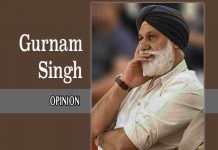In May 2018, a Sikh journalist wrote an article with the heading: Winter is coming: Why Sikhs need to prepare for the imminent storm. With global Sikh experience and the most recent events in India and Pakistan in mind, that heading seems even more relevant today.
The journalist, Sunny Hundal, wrote about the mission of his brother Jagraj Singh and concluded: Jagraj Singh said something important: Guru Sahib has told us – where ever we are, take hold of power and change! For whom? Change not for our benefit but… working for the benefit of everyone. Sikhs are the ones who are willing to put their lives on the line to give other people freedom.
Sunny Hundal predicted that the clash between Indian state and diaspora Sikhs will grow as the Sikh diaspora matures and becomes more powerful&hellip. Modi also knows a clash with Sikhs in India is inevitable. The aim of the Indian government to split the Sikh community will intensify. Therefore, Sikhs need think-tanks, advocacy groups, research organisations. They need Political Action Committees.
His advice is that Sikhs need to get much better at managing internal disagreement. Those in positions of influence within the community or with the establishment, should not exploit ideological disagreements but find common solutions or ring-fence unresolved differences.
Unlike other reform movements led by the great saints of India, the Sikhi movement started by Guru Nanak Sahib towards the end of the 15th century, survived against all odds. According to historian philosophers, this was due to the unique combination in Sikhi of bhagti (spiritual living) backed by shakti (political power). This miri-piri combination gives the Sikhs their qaumi or national identity.
This is the gift of the Guru Jot-Jugat Light which guided the Sikhs from Guru Nanak Sahib to Guru Gobind Singh and now resides in the twin institution of Shabd Guru enshrined in Sri Guru Granth Sahib and the Guru Khalsa Panth. In the governance of the Sikh nation, Guru Granth Sahib is the Constitution from which are derived the laws and the executive functions and objectives of the Khalsa nation. Yet, due to the inclusive universal ideals enshrined in Guru Granth Sahib the objective of such a regime is not a one-religion state. This was amply illustrated by the Khalsa Raj under Baba Banda Singh Bahadur and Maharaja Ranjit Singh. All communities become equal partners (bhaiwaal) in such a just regime (halemi raj).
Advocate Gurmit Singh Sirsa in his, A Critique of Sikhism, quoted two philosophers of history, Oswald Spengler and Ernest Renan to show that what ultimately makes a group a nation (a qaum) is not any material or temporal factor but the will to be one. This will is the spiritual urge, an impulse to form a union, on the basis of a certain way of life.
The legacy of Nanak X, Guru Gobind Singh ji, is the niara Khalsa nation empowered to gain political influence and to bring about change. For whom? As late Bhai Jagraj Singh concluded, Change not for our benefit but… working for the benefit of everyone. For example, Sikhs in India can do much for the disadvantaged classes of India and win their support at the same time.
Gurmukh Singh OBE, a retired UK senior civil servant, chairs the Advisory Board of The Sikh Missionary Society UK. Email: sewauk2005@yahoo.co.uk. The article appeared here.
* This is the opinion of the writer, organisation or publication and does not necessarily represent the views of Asia Samachar.
RELATED STORY:
Guru Nanak’s Revolution (Asia Samachar, 6 Nov 2019)
Annexation of Jammu & Kashmir and the unfolding Hindutva Imperial Project (Asia Samachar, 21 Aug 2019)
ASIA SAMACHAR is an online newspaper for Sikhs / Punjabis in Southeast Asia and beyond. Facebook | WhatsApp +6017-335-1399 | Email: editor@asiasamachar.com | Twitter | Instagram | Obituary announcements, click here |































